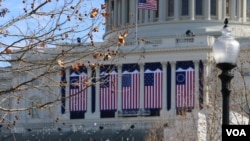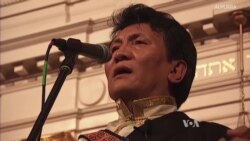The Refugee Ball on Tuesday wasn't a gala, with the same celebratory atmosphere expected for Inauguration Day on Friday, when Donald Trump becomes the nation’s 45th president.
While there were a few gowns and at least one tuxedo at the ball, it was mostly after-work attire. There was no glitter, no champagne and no president. What it did have was a few hundred guests, seated mostly in the center pews of the Sixth & I Historic Synagogue in Washington, D.C., listening to a mix of performances by first- and second-generation Americans.
It wasn't a protest to the inauguration, as some events this week are billed. Nor was it decidedly anti-Trump, though the president-elect did associate refugees with terrorism during his campaign, declaring he would send Syrians back to their home country.
As president, he will have broad power over the refugee program, and could cut off arrivals immediately.
WATCH: Performers Take the Stage at Refugee Ball
But for a few hours on a misty Tuesday evening in January, it was a reminder that whittling down the refugee program could affect real people in the worst moments of their lives.
Michael Namalum, a human rights activist and torture victim from Azerbaijan who was granted asylum in the United States in 2015, took the stage to implore the incoming president: "I'm begging the new administration ... not to turn their back on these people."
The crowd was a mix of immigration lawyers and activists, refugees and asylum-seekers. The emcee was an Ethiopian asylum-seeker and former journalist; the first performer was an Iranian-American female rapper; the second a classically trained Tibetan musician, and on the list went.
"I know it's crazy out there, it's a hard time. If we stick together, we'll get through it," the rapper, Mana, encouraged the crowd.
Jason Dzubow, an asylum lawyer in Washington, pulled the event together in about a month with fellow attorney Sameen Ahmadnia. This is "not to celebrate the new president; nor is it to denigrate him," Dzubow said, but rather "to remind ourselves of why accepting refugees, asylum-seekers, and immigrants into our society is so important."
The U.S. refugee program began with the Displaced Persons Act of 1948, three years after the end of World War II and at the beginning of the Cold War with Russia.
"America did not create the asylum system to be nice," Dzubow explained to the crowd of about 300 at the Refugee Ball. Instead, he said, it serves greater U.S. interests. "It sends a powerful message — when you work with us, when you work for the values we believe in, America's got your back."






